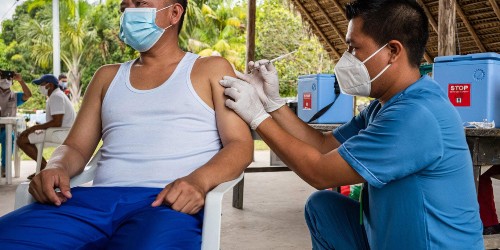WASHINGTON, DC – The World Bank’s Pandemic Fund Governing Board has approved US$300 million in financing for its first round of funding to help Caribbean and other developing countries better prepare for and respond to future pandemics.
 The Washington-based financial institution said the Fund is also inviting interested eligible countries and implementing entities to submit expressions of interest (EOI) for potential projects to be supported by this initial funding.
The Washington-based financial institution said the Fund is also inviting interested eligible countries and implementing entities to submit expressions of interest (EOI) for potential projects to be supported by this initial funding.
The projects to be financed by the first round of funding will prioritize strengthening comprehensive disease surveillance and early warning, laboratory systems, and human resources/public health workforce capacity.
“This is in line with the International Health Regulations (IHR) (2005) and other internationally-endorsed legal frameworks, and consistent with a One Health approach,” the bank said.
The EOI will help facilitate potential collaboration among countries and partners, and better assess their interest and needs.
The selection process will conclude with a review of formal proposals to be solicited in March, the World Bank said.
“I’m pleased that the Pandemic Fund is moving forward quickly with its first round of funding to help countries and regions build resilience to future global health threats,” World Bank Group President David Malpass said.
“The Fund will play a vital role by complementing investments and technical support from existing international institutions and incentivizing countries to increase their own efforts to strengthen pandemic prevention, preparedness, and response capacity,” he added.
The World Bank said the Pandemic Fund, a collaborative partnership among donor governments, co-investor countries, foundations, civil society organizations, and international agencies, was created last year “to provide a dedicated stream of additional, long-term funding for critical pandemic prevention, preparedness and response (PPR) in eligible low- and middle-income countries, through investments and technical support.”
Multilateral Development Banks, United Nations agencies and specialized global health institutions currently serve as the Fund’s implementing entities, the bank said.
“In the face of multiple global challenges and competing priorities, the Pandemic Fund is a significant innovation in global health financing that helps us stay focused on investing in pandemic PPR in low- and middle-income countries,” said Dr. Chatib Basri, chair of the Board. “We’re off to a very good start but the financing needs are enormous, so we look forward to additional contributions in the coming months. In the meanwhile, we will deploy the available funding for greatest impact.”
The. Pandemic Fund will allocate financing where investments are most urgently needed to bolster PPR for COVID-19 and future pandemics, addressing key capacity gaps at national, regional and global levels.
“The goal is to attract high-impact projects that reflect strong ownership of beneficiaries, catalyze additional external financing, incentivize countries to prioritize and invest in PPR, and promote cooperation and coordination among partners,” it said.
Consistent with the Pandemic Fund’s principles, the World Bank said implementing entities are encouraged to provide significant co-financing to the projects and use Pandemic Fund grant financing to catalyze additional project financing from other sources.
“The Pandemic Fund is strongly committed to helping low- and middle-income countries effectively prevent, detect, and respond to global disease outbreaks,” said Priya Basu, executive head of the Pandemic Fund Secretariat. “We are working fast to deliver on that promise, while making sure we get things right. The first round of funding will be a proof of concept and we look forward to learning from it and adjusting as we go along.”
The World Bank said the Governing Board also approved a results framework. It said the newly-formed Technical Advisory Panel (TAP), chaired by the World Health Organization, and comprising of 21 diverse multidisciplinary experts, will advise the Board on funding allocations, by providing analysis and evidence-based recommendations, based on an evaluation of the individual formal proposals.
Interested countries and implementing entities are invited to submit the EOI form by February 24, 2023, the bank said.


